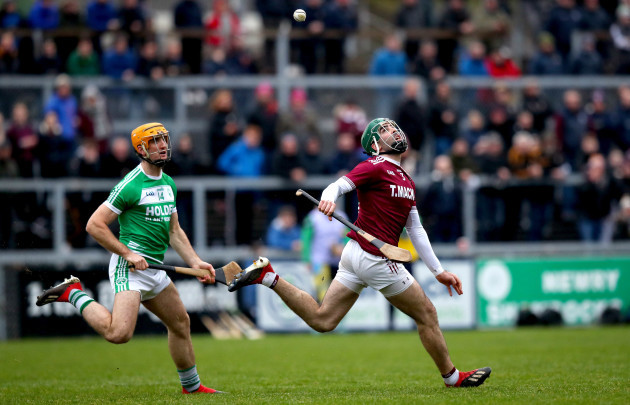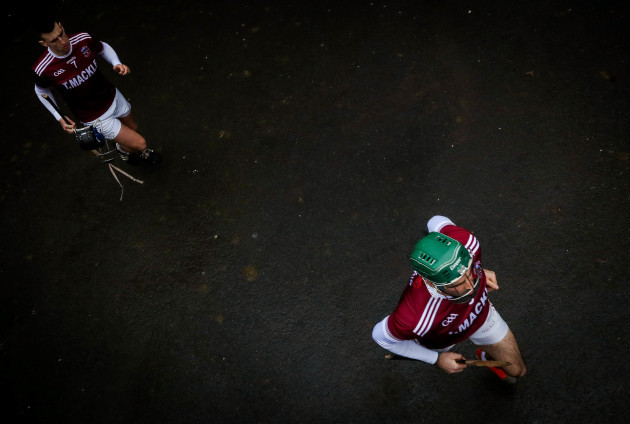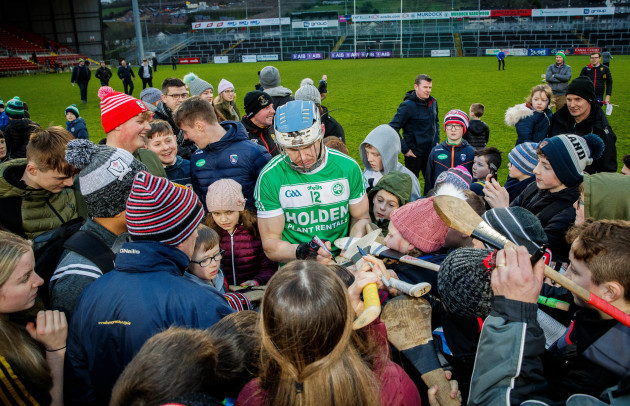SPEAKING IN THE lead-up to Slaughtneil’s All-Ireland semi-final yesterday, Chrissy McKaigue recalled a pre-game speech given by Jordanstown manager Adrian McGuckin one year before they played the Sigerson Cup final.
The gist of McGuckin’s talk to his players was that it’s always the defeats that linger, regardless of how much you win during your career.
It’s human nature that the near misses – rather than the glorious wins – tend to stick with us longer.
And while Slaughtneil showed undoubted heart and grit to bring reigning champions Ballyhale Shamrocks to the wire in Newry, they succumbed to a third loss at the semi-final stage of the Tommy Moore Cup.
When McKaigue and his team-mates woke up this morning, the pain of watching another chance at lifting the big prize in Croke Park slip away must have been galling.
Yet it’s important they remember what they’ve achieved over the years.
Before 2016, no club from Derry had won an Ulster title. In the past four years, Slaughtneil have been crowned provincial hurling champions on three occasions. In 2014, 2016 and 2017, they also delivered Ulster football crowns with largely the same selection of players operating across both codes.
Still, it’s the losses that stay with you.
But the importance of Slaughtneil’s success over the past decade runs far deeper than the games they’ve won or the silverware they’ve lifted. They’ve effectively kept the small ball code alive up north at a time when Ulster hurling is on its knees.
McKaigue observed as much recently when he said: “In many ways, if it wasn’t for Ulster club hurling at the minute, Ulster hurling would be extinct.
“You see that with the turnouts in the Ulster club hurling final – it’s the biggest crowd by far. You know, with the second and third tier competitions at inter-county level – everyone has their opinions on it but one fact, there aren’t too many going to watch it.
“Maybe that’s an indication of the interest and prestige associated with those competitions. There certainly is more of a pull with Ulster club hurling. As a hurler in Ulster, we’re acutely aware that we protect that.
“We’re hugely passionate about hurling with our club and we do everything to promote it. We try to be the best that we can be.”
The sight of Ballyhale boss Henry Shefflin on the Pairc Esler field signing autographs and taking selfies with fans over an hour after yesterday’s game ended showed how passionate the people of Ulster remain about their hurling.
In excess of 5,000 supporters were estimated to have packed into the Newry venue on the first Sunday in January, which isn’t exactly prime-time for hurling. But it proves the interest is there.
If it wasn’t for Slaughnteil’s recent exploits, top-class hurling action to follow in Ulster would be few and far between.
The Ulster senior hurling championship has been defunct since 2017.
To the south-east of the rural Derry club, Casement Park – once the Mecca of Ulster hurling – has fallen into a depressing state of disrepair.
Brilliant Antrim forward Neil McManus hasn’t played at Casement since 2012. At 32-years-old, there’s no guarantee he’ll line out at the historic venue again before his career finishes.
Former Waterford boss Paraic Fanning last night accused the GAA of “failing hurling” in the north.
“Today’s game in Newry should serve as a reminder to GAA at National level that they are failing hurling in Ulster,” he tweeted.
“The fact that Slaughtneil again produced a performance of such quality owes more to their organization, love of the game than anything we have done at National level.”
Today’s game in Newry should serve as a reminder to GAA at National level that they are failing hurling in Ulster. The fact that Slaughtneil again produced a performance of such quality owes more to their organization, love of the game than anything we have done at National level
— Paraic Fanning (@Paraic_Fanning) January 5, 2020
He added: “[I] watched a number of club teams from the of Ulster in recent years. Believe me the standard of hurling among each of the top teams in places like Antrim, Derry and Down is as high as any of the top teams in the leading hurling counties. Not one bit surprised with Slaughtneil today.”
It’s hard to argue with Fanning’s point.
The GAA continue to push the Super 11s concept in America during the off-season, when resources would clearly be better spent promoting hurling in the weaker counties.
RTÉ’s Pauric Lodge suggested that the Allianz Hurling League final should be played at an Ulster venue – a novel way of bringing top-level hurling to the province.
It’d certainly be a start. For now though, Slaughtneil are the keepers of the hurling flame in Ulster.
They may not have an All-Ireland final to look forward to, but the Robert Emmets club have done far more than most in recent times to promote the game in Ulster.
That’s a legacy that will stand the test of time.
The42 is on Instagram! Tap the button below on your phone to follow us!



